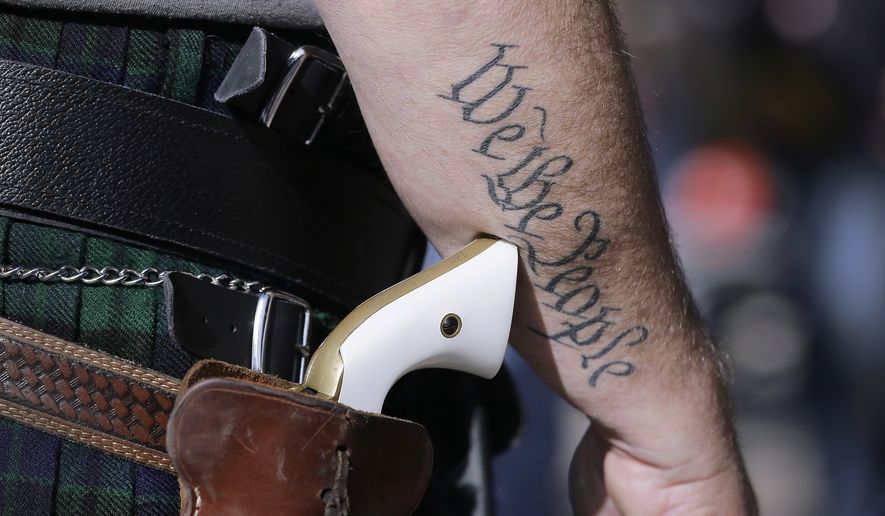An appellate court has struck down a 53-year-old federal law that bars handgun sales to anyone younger than 21, setting up a potential Supreme Court case.
A three-judge panel of the 4th U.S. Circuit Court of Appeals, based in Richmond, Virginia, said Tuesday that the law, enacted by Congress in 1968, violates the Second Amendment.
The court issued the 2-1 ruling in a case involving a 19-year-old woman who sought to buy a handgun when an abusive ex-boyfriend failed to appear for a court proceeding after she secured a protective order against him.
Judge Julius Ness Richardson, a Trump appointee, held that the Second Amendment extends to 18- to 20-year-olds. Judge G. Steven Agee, a Bush appointee, joined him in the ruling.
“When do constitutional rights vest? At 18 or 21? 16 or 25? Why not 13 or 33? In the law, a line must sometimes be drawn. But there must be a reason why constitutional rights cannot be enjoyed until a certain age. Our nation’s most cherished constitutional rights vest no later than 18. And the Second Amendment’s right to keep and bear arms is no different,” Judge Richardson wrote for the court.
The decision clashes with a 2012 ruling by the 5th U.S. Circuit Court of Appeals, based in New Orleans, which upheld the law barring 18-year-olds from buying handguns.
The 5th Circuit ruled that the age of majority was understood to be 21 when the Founders drafted the Constitution. The federal government unsuccessfully relied on that same argument in the 4th Circuit dispute.
Legal scholars say such split decisions in appellate courts typically result in Supreme Court cases.
Congress enacted the law in 1968 to help curb juvenile crime. It has banned licensed dealers from selling handguns to anyone younger than 21, but it did not bar the sale of shotguns and rifles.
In the 4th Circuit ruling, Judge Richardson said 18-year-olds have Second Amendment rights. When the Founders drafted the Constitution, he reasoned, laws required 18-year-olds to join the militia and even bring their own guns.
“While some historical restrictions existed, none support finding that 18-year-olds lack rights under the Second Amendment,” the judge wrote.
Judge James Andrew Wynn Jr., an Obama appointee, disagreed with the majority’s decision to strike down the federal law. He said his colleagues invalidated Congress’ “long-established effort to control gun violence.”
“The majority’s decision to grant the gun lobby a victory in a fight it lost on Capitol Hill more than fifty years ago is not compelled by law. Nor is it consistent with the proper role of the federal judiciary in our democratic system,” Judge Wynn wrote in his dissent.
The case was brought by 19-year-old Natalia Marshall, who obtained a protective order against an abusive ex-boyfriend who had been arrested for possessing a firearm and controlled substances. He posted bail and did not show up to court proceedings.
Ms. Marshall works in rural areas as an equestrian trainer. She was denied the opportunity to purchase a handgun because of the 1968 federal law.
Elliott Harding, who represented Ms. Marshall, said he hopes the issue makes its way to the high court.
“I’m hopeful the case will find its way to the Supreme Court should they deem it worthy of consideration, as there’s a circuit split now and the case has significant implications for current and potential legislation concerning young adults’ access to firearms,” Mr. Harding said.
A spokesperson for the Department of Justice, which represented the federal government in the case, declined to say whether the department will ask the 4th Circuit to reconsider the ruling or take the matter to the Supreme Court.
“We respectfully disagree with the court’s decision and are considering our options,” said Bob Page, the Justice Department spokesperson.
Court watchers said the Justice Department likely will petition for a rehearing with the full 4th Circuit before the case heads to the high court. The 4th Circuit is composed mostly of Democratic appointees.
Elliot Mincberg, a senior fellow at People for the American Way, said the full court likely would reverse the three-judge panel’s decision and rule in line with the 5th Circuit.
“There are plenty of Republican and conservative judges that have ruled in favor of this kind of limitation,” Mr. Mincberg told The Washington Times. “With what has happened with the increasing radicalization of many Republican appointees — particularly those nominated by President Trump — that has obviously changed a lot.”
The Supreme Court already has decided to take up one Second Amendment case for the next term. Justices will weigh in on a law in New York that requires applicants for a carry license to show a particular need for a firearm.
Laurence Tribe, a professor at Harvard Law School, said the justices might want to resolve the split between the 4th and 5th circuits if the full 4th Circuit does not reverse the panel’s decision.
“Circuit conflicts on important questions of federal law ordinarily lead the Supreme Court to grant certiorari to resolve the conflict. In hot-button areas like gun rights, however, that’s less automatic than in other areas, so predicting that the Fourth Circuit decision in this case will join the open-carry case already pending in the Court for the coming Term would be reasonable but by no means a sure thing,” Mr. Tribe said.
He predicted an ideological split if the Supreme Court, with its 6-3 conservative majority, weighs in on the issue.
“If the court does agree to hear the case, I’m fairly confident that it would rule as the 4th Circuit panel did, probably over three dissents,” Mr. Tribe said.
• Alex Swoyer can be reached at aswoyer@washingtontimes.com.




Please read our comment policy before commenting.